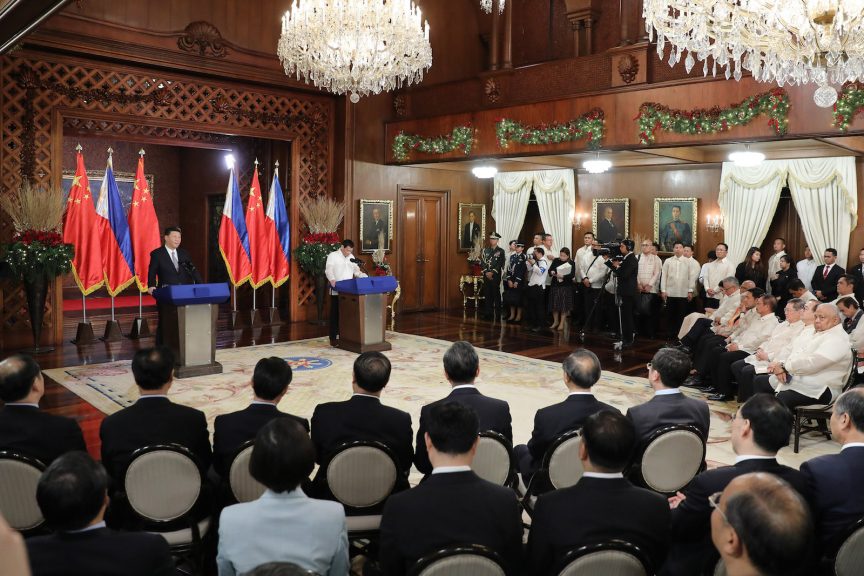 President Rodrigo Roa Duterte and Chinese President Xi Jinping read their joint press statement following the expanded bilateral meeting at the Malacañan Palace on November 20, 2018. ALFRED FRIAS/PRESIDENTIAL PHOTO
President Rodrigo Roa Duterte and Chinese President Xi Jinping read their joint press statement following the expanded bilateral meeting at the Malacañan Palace on November 20, 2018. ALFRED FRIAS/PRESIDENTIAL PHOTO
DAVAO CITY (MindaNews/ 22 Nov.) – The agreements signed between the Philippines and China during the two-day visit of Chinese President Xi Jinping to the country included expressway and bridge projects for Davao Region and Marawi City.
Xi and President Rodrigo Duterte signed a total of 29 deals formalizing cooperation or assistance on infrastructure, oil and gas exploration, education, information technology, humanitarian assistance and agriculture.
Bilateral documents signed included exchange of letters on the bridge and road project in Marawi, which was destroyed by a five-month battle between government forces and Islamic State-inspired militants in 2017.
City Vice Mayor Bernard Alag said in an interview at the sidelines of the opening of the Big Bad Wolf at The Tent in Azuela Cove that the city government welcomes the support of the national government in undertaking these Chinese government-supported infrastructure projects that will address traffic congestion.
“These projects from the national government. We, from the local government, welcome this move. Whatever the national government can provide to the city, we will accept this and we will be thankful because these are big ticket projects,” he added.
Duterte signed with Xi the implementation agreement of the feasibility study for Davao City Expressway project and the exchange of letters on the Davao River Bridge Project.
Last year, Finance Secretary Carlos G. Dominguez III and China Commerce Vice Minister Fu Ziying, China’s International Trade Representative, formalized the agreement on the conduct of preliminary feasibility study for the proposed 23.3-kilometer expressway.
It will be constructed above ground and will be implemented in three phases: first phase will start from Carlos P. Garcia National Highway, Maa, Talomo, and Sta. Ana Wharf; second phase, from Carlos P. Garcia National Highway, to Maa, to Talomo, and to Panacan; and third phase, from Carlos P. Garcia National Highway, to Maa, to Talomo, and to Bangkal.
Meanwhile, the 800-meter Davao River Bridge project worth P1.5 billion will connect Segment B (Times Beach area to Roxas Avenue) of the 18.20-kilometer Davao City Coastal Road Project. Segment B is scheduled for implementation next year.
The other three segments of this coastal road project are Segment A (from Bago Aplaya to Times Beach), Segment C (from Roxas Avenue to Sta. Ana Avenue), and Segment D (from Sta. Ana Avenue to R. Castillo).
Duterte and Xi also signed the memorandum of understanding (MOU) jointly promoting cooperation in key infrastructure projects in Davao region between the Philippines’ Department of Finance and Ministry of Commerce of China.
The other bilateral documents signed between two countries included MOU on cooperation on the Belt and Road Initiative, MOU on cooperation on oil and gas development, MOU between the Foreign Service Institute of the Philippines and the China Foreign Affairs University, executive program of the cultural agreement between the two governments for 2019 to 2023, and MOU on basic education cooperation between the Department of Education and China’s Ministry of Education.
Some lawmakers, meanwhile, have called on Malacanang to disclose the details of the agreements it had signed with China.
ACTS Teacher Rep. Antonio Tinio said government has the obligation to let the people know about the content of such agreements. He expressed concerns the agreements may have compromised the country’s sovereignty over territories in the West Philippine Sea.
He cited the latest Social Weather Stations survey showing that 84 percent of Filipinos did not agree with government inaction on Chinese incursion in the West Philippine Sea.
Senator Francis Escudero made a similar call. He said the Palace should divulge the details of the agreements, in particular the joint exploration deal, and allow the people to comment on whether or not these are acceptable to them.
Senator Grace Poe said the Philippines should enter into such agreements with the framework that the country owns the island-like formations in the West Philippine Sea based on the decision of the Permanent Arbitral Tribunal in 2016. (Antonio L. Colina IV/MindaNews)
